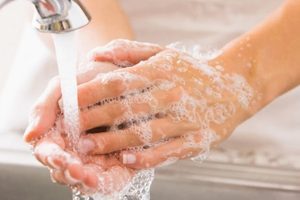
Antibacterial Chemicals Are Being Released Into The Environment. Tons of chemicals in antibacterial soaps used in the bathrooms and kitchens of virtually every home are being released into the environment, yet no government agency is monitoring them or regulating them in water supplies or food. About 75 percent of a potent bacteria-killing chemical that people flush […]

Antibacterial Chemicals Are Being Released Into The Environment. Tons of chemicals in antibacterial soaps used in the bathrooms and kitchens of virtually every home are being released into the environment, yet no government agency is monitoring them or regulating them in water supplies or food.
About 75 percent of a potent bacteria-killing chemical that people flush down their drains survives treatment at sewage plants, and most of that ends up in sludge spread on farm fields, according to Johns Hopkins University research. Every year, it says, an estimated 200 tons of two compounds; triclocarban and triclosan are applied to agricultural lands throughout the country.
The new findings add to the growing concerns of many scientists that the Environmental Protection Agency needs to address thousands of pharmaceuticals and consumer-product chemicals that wind up in the environment when they are flushed into sewers. The findings were published recently in the journal Environmental Science & Technology.
From dishwashing soaps to cutting boards, about 1,500 new antibacterial consumer products containing the two chemicals have been introduced into the marketplace since 2000. Some experts worry that widespread use of such products may be helping turn some dangerous germs into “superbugs” that are resistant to antibiotics.
Triclocarban, an ingredient of antibacterial bar soaps and toothpaste, is “potentially problematic” because it breaks down slowly, which means it is accumulating in soil and perhaps water, said Rolf Halden, an assistant professor at Johns Hopkins University’s department of environmental health sciences, who led the study.
“What we are finding is this chemical is building up in the environment,” Halden said. “This is an example of an emerging contaminant. It has been in the environment for almost five decades, and we manufacture large volumes of it, but we don’t know what happens to it.”
Triclosan, which is more abundant because it is used in liquid soaps, has been detected in human breast milk and fish in streams in Europe.
The personal injury attorneys at Parker Waichman LLP offer free, no-obligation case evaluations. For more information, fill out our online contact form or call 1-800-YOURLAWYER (1-800-968-7529).


